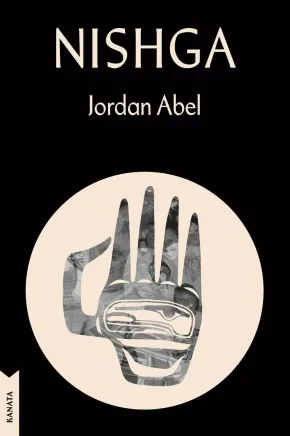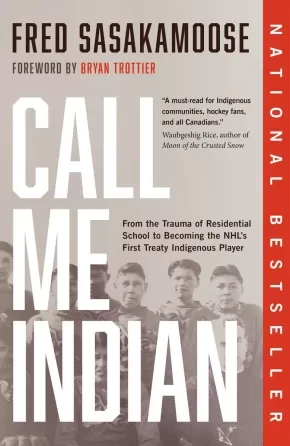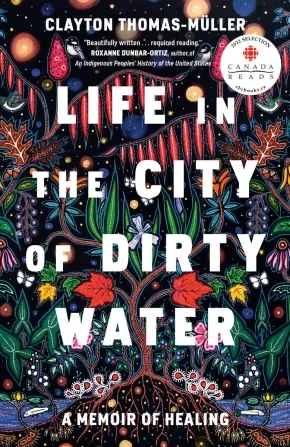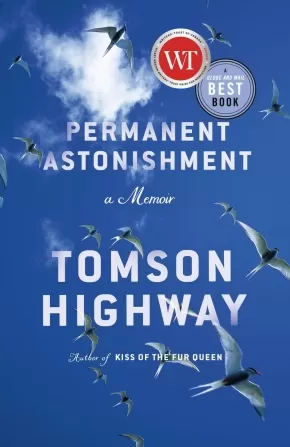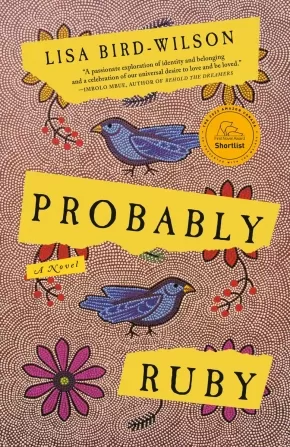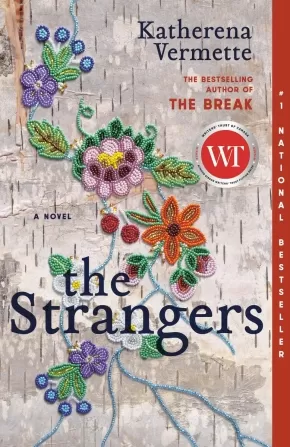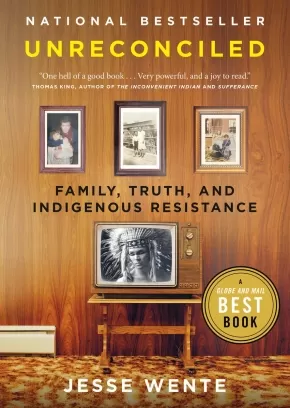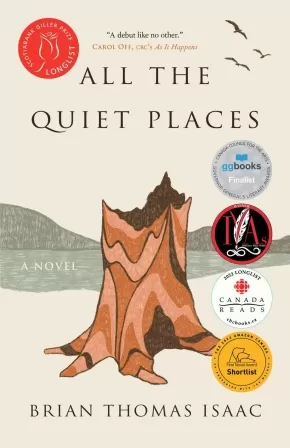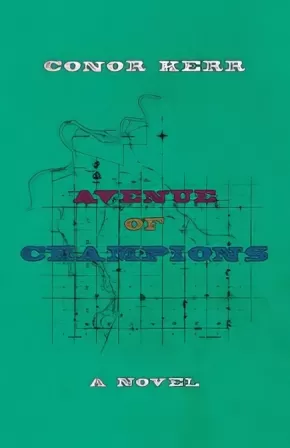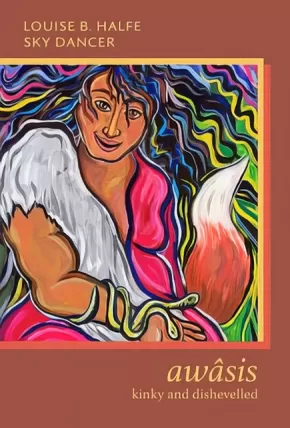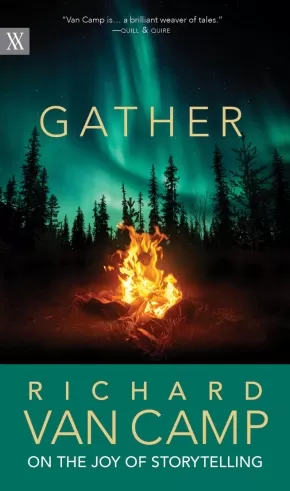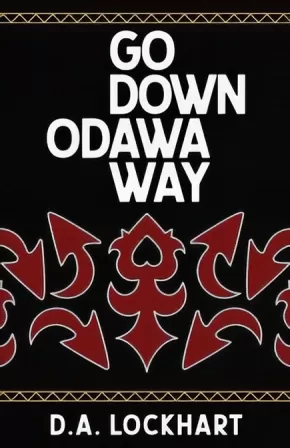
2022 - 2023 Selections
1
-
15
of
37 Results;
Sort By
Go To
of 3
Nishga: Kanata Classics Edition
$22.00
Format:
Paperback
Text Content Territories:
Indigenous Canadian; First Nations; Nisga'a;
Reading Level: N/A
ISBN / Barcode: 9780771023491
Synopsis:
Synopsis:
Part of the inaugural Kanata Classics list, with a new introduction by David Chariandy, NISHGA is a groundbreaking, deeply personal, and devastating autobiographical meditation that attempts to address the complicated legacies of Canada’s residential school system and contemporary Indigenous existence.
As a Nisga'a writer, Jordan Abel often finds himself in a position where he is asked to explain his relationship to Nisga'a language, Nisga'a community, and Nisga'a cultural knowledge. However, as an intergenerational survivor of residential school--both of his grandparents attended the same residential school--his relationship to his own Indigenous identity is complicated to say the least.
NISHGA explores those complications and is invested in understanding how the colonial violence originating at the Coqualeetza Indian Residential School impacted his grandparents' generation, then his father's generation, and ultimately his own. The project is rooted in a desire to illuminate the realities of intergenerational survivors of residential school, but sheds light on Indigenous experiences that may not seem to be immediately (or inherently) Indigenous.
Drawing on autobiography and a series of interconnected documents (including pieces of memoir, transcriptions of talks, and photography), NISHGA is a book about confronting difficult truths and it is about how both Indigenous and non-Indigenous peoples engage with a history of colonial violence that is quite often rendered invisible.
Reviews
“With NISHGA, Jordan Abel has reinvented the memoir, incorporating personal anecdotes, archival footage, legal documentation, photos and concrete poetry to create an unforgettable portrait of an Indigenous artist trying to find his place in a world that insists Indigeneity can only ever be the things that he is not. Abel deftly shows us the devastating impact this gate-keeping has had on those who, through no decisions of their own, have been ripped from our communities and forced to claw their way back home, or to a semblance of home, often unassisted. This is a brave, vulnerable, brilliant work that will change the face of nonfiction, as well as the conversations around what constitutes Indigenous identity. It's a work I will return to again and again.” —Alicia Elliott, author of A Mind Spread Out on the Ground
“In NISHGA, Jordan Abel puts to use the documentary impulse that has already established him as an artist of inimitable methodological flair. By way of a mixture of testimonial vignettes, recordings of academic talks, found text/art, and visual art/concrete poetry, Abel sculpts a narrative of dislocation and self-examination that pressurizes received notions of “Canada” and “history” and “art” and “literature” and “belonging” and “forgiveness.” Yes, it is a book of that magnitude, of that enormity and power. By its Afterword, NISHGA adds up to a work of personal and national reckoning that is by turns heartbreaking and scathing.” —Billy-Ray Belcourt, author of NDN Coping Mechanisms and A History of My Brief Body
"This is a heart-shattering read, and will also be a blanket for others looking for home. NISHGA is a work of absolute courage and vulnerability. I am in complete awe of the sorrow here and the bravery. Mahsi cho, Jordan.” —Richard Van Camp, author of Moccasin Square Gardens
“Jordan Abel digs deeply into the questions we should all be asking. Questions that need no explanation but ones that require us to crawl back into our bones, back into the marrow of our understanding. NISHGA is a ceremony where we need to be silent. Where we need to listen.” —Gregory Scofield, author of Witness, I Am
Educator & Series Information
This edition of Nishga is part of the Kanata Classics series, which celebrates timeless books that reflect the rich and diverse range of voices in Canadian literature.
Additional Information
304 pages | 5.54" x 8.26" | Paperback
Call Me Indian: From the Trauma of Residential School to Becoming the NHL's First Treaty Indigenous Player
$21.00
Format:
Paperback
Text Content Territories:
Indigenous Canadian; First Nations; Cree (Nehiyawak); Plains Cree; Ahtahkakoop Cree Nation;
Reading Level: N/A
ISBN / Barcode: 9780735240032
Synopsis:
Synopsis:
Trailblazer. Residential school Survivor. First Treaty Indigenous player in the NHL. All of these descriptions are true--but none of them tell the whole story.
Fred Sasakamoose, torn from his home at the age of seven, endured the horrors of residential school for a decade before becoming one of 120 players in the most elite hockey league in the world. He has been heralded as the first Indigenous player with Treaty status in the NHL, making his official debut as a 1954 Chicago Black Hawks player on Hockey Night in Canada and teaching Foster Hewitt how to pronounce his name. Sasakamoose played against such legends as Gordie Howe, Jean Beliveau, and Maurice Richard. After twelve games, he returned home.
When people tell Sasakamoose's story, this is usually where they end it. They say he left the NHL to return to the family and culture that the Canadian government had ripped away from him. That returning to his family and home was more important to him than an NHL career. But there was much more to his decision than that. Understanding Sasakamoose's choice means acknowledging the dislocation and treatment of generations of Indigenous peoples. It means considering how a man who spent his childhood as a ward of the government would hear those supposedly golden words: "You are Black Hawks property."
Sasakamoose's story was far from over once his NHL days concluded. He continued to play for another decade in leagues around Western Canada. He became a band councillor, served as Chief, and established athletic programs for kids. He paved a way for youth to find solace and meaning in sports for generations to come. Yet, threaded through these impressive accomplishments were periods of heartbreak and unimaginable tragedy--as well moments of passion and great joy.
This isn't just a hockey story; Sasakamoose's groundbreaking memoir sheds piercing light on Canadian history and Indigenous politics, and follows this extraordinary man's journey to reclaim pride in an identity and a heritage that had previously been used against him.
Reviews
“Fred Sasakamoose played in the NHL before First Nations people had the right to vote in Canada. This page turner will have you cheering for “Fast Freddy” as he faces off against huge challenges both on and off the ice—a great gift to every proud hockey fan, Canadian, and Indigenous person.”—Wab Kinew, Leader of the Manitoba NDP and author of The Reason You Walk
“Call Me Indian needs to be in every library and on every school curriculum in Canada. Fred Sasakamoose’s story is gripping and powerfully told—a story of triumph and tragedy, of great success and the perils of excess. There is laughter and tears here aplenty, but also inspiration. Characters as large as Gordie Howe and Bobby Hull are easily matched by the likes of Moosum, Freddy’s grandfather; Father Roussel, the only good to be found in residential school; George Vogan, who always believed in Fred—and Loretta, who loved him, gave him family, and ultimately saved him.”—Roy MacGregor, bestselling author of Chief: The Fearless Vision of Billy Diamond and Canadians: Portrait of a Country
Additional Information
288 pages | 5.20" x 7.94" | 8 pp 4/c photo insert
Meg Masters assisted Fred in writing his memoir. She is a Toronto-based writer and editor who has worked with many bestselling Canadian authors.
Life in the City of Dirty Water: A Memoir of Healing (PB)
$19.95
Format:
Paperback
Text Content Territories:
Indigenous Canadian; First Nations; Cree (Nehiyawak); Swampy Cree ; Mathias Colomb First Nation;
ISBN / Barcode: 9780735240087
Synopsis:
Synopsis:
An electrifying memoir that braids together the urgent issues of Indigenous rights and environmental policy, from a nationally and internationally recognized activist and survivor.
There have been many Clayton Thomas-Mullers: The child who played with toy planes as an escape from domestic and sexual abuse, enduring the intergenerational trauma of Canada's residential school system; the angry youngster who defended himself with fists and sharp wit against racism and violence, at school and on the streets of Winnipeg and small-town British Columbia; the tough teenager who, at 17, managed a drug house run by members of his family, and slipped in and out of juvie, operating in a world of violence and pain.
But behind them all, there was another Clayton: the one who remained immersed in Cree spirituality, and who embraced the rituals and ways of thinking vital to his heritage; the one who reconnected with the land during summer visits to his great-grandparents' trapline in his home territory of Pukatawagan in northern Manitoba.
And it's this version of Clayton that ultimately triumphed, finding healing by directly facing the trauma that he shares with Indigenous peoples around the world. Now a leading organizer and activist on the frontlines of environmental resistance, Clayton brings his warrior spirit to the fight against the ongoing assault on Indigenous peoples' lands by Big Oil.
Tying together personal stories of survival that bring the realities of the First Nations of this land into sharp focus, and lessons learned from a career as a frontline activist committed to addressing environmental injustice at a global scale, Thomas-Muller offers a narrative and vision of healing and responsibility.
Reviews
“Clayton Thomas-Müller—Cree poet and environmental warrior dedicated to decolonization—has crafted an awesome, lyrical memoir that captures the experiences of urban Indigenous youth facing poverty, drugs, alcohol, domestic violence, and juvenile detention. Most, like Clayton, inherited the intergenerational trauma of residential schools. Clayton found a way to escape trauma and poverty in order to fight for his people. This beautifully written book is required reading for everyone who cares about justice for the survivors of genocide who continue to survive in colonized conditions. It offers a path to liberation that may also be the way to saving the earth and humanity itself.” — Roxanne Dunbar-Ortiz, author of An Indigenous Peoples’ History of the United States
“This book is an adventure story in every way. A life of drug dealers and crackhouses and guns; leaving that behind for a remarkable time of spiritual and personal growth; and there’s the ongoing adventure of working desperately to protect the planet and its sacred places. Clayton Thomas-Müller relates these adventures in ways that will help everyone through unfamiliar terrain—he’s a trustworthy guide and an authentic storyteller. In a moment when Indigenous people around the world are coming to the very fore of the most crucial fights, this volume will broaden your understanding in powerful ways. And you won’t forget its scenes any time soon.”—Bill McKibben, co-founder of 350.org and author of Earth and Oil and Honey
Additional Information
240 pages | 5.19" x 7.97" | Paperback
Permanent Astonishment: A Memoir (PB)
$22.00
Format:
Paperback
Text Content Territories:
Indigenous Canadian; First Nations; Cree (Nehiyawak);
Reading Level: N/A
ISBN / Barcode: 9780385696227
Synopsis:
Synopsis:
Capricious, big-hearted, joyful: an epic memoir from one of Canada’s most acclaimed Indigenous writers and performers.
Tomson Highway was born in a snowbank on an island in the sub-Arctic, the eleventh of twelve children in a nomadic, caribou-hunting Cree family. Growing up in a land of ten thousand lakes and islands, Tomson relished being pulled by dogsled beneath a night sky alive with stars, sucking the juices from roasted muskrat tails, and singing country music songs with his impossibly beautiful older sister and her teenaged friends. Surrounded by the love of his family and the vast, mesmerizing landscape they called home, his was in many ways an idyllic far-north childhood. But five of Tomson's siblings died in childhood, and Balazee and Joe Highway, who loved their surviving children profoundly, wanted their two youngest sons, Tomson and Rene, to enjoy opportunities as big as the world. And so when Tomson was six, he was flown south by float plane to attend a residential school. A year later Rene joined him to begin the rest of their education. In 1990 Rene Highway, a world-renowned dancer, died of an AIDS-related illness.
Permanent Astonishment: Growing Up in the Land of Snow and Sky is Tomson's extravagant embrace of his younger brother's final words: "Don't mourn me, be joyful." His memoir offers insights, both hilarious and profound, into the Cree experience of culture, conquest, and survival.
Additional Information
352 pages | 5.15" x 7.97" | Paperback
Probably Ruby: A Novel (PB)
$19.95
Format:
Paperback
Text Content Territories:
Indigenous Canadian;
ISBN / Barcode: 9780385696708
Synopsis:
Synopsis:
For readers of Tommy Orange's There There and Terese Marie Mailhot's Heart Berries, Probably Ruby is an audacious, brave and beautiful book about an adopted woman's search for her Indigenous identity.
Relinquished as an infant, Ruby is placed in a foster home and finally adopted by Alice and Mel, a less-than-desirable couple who can't afford to complain too loudly about Ruby's Indigenous roots. But when her new parents' marriage falls apart, Ruby finds herself vulnerable and in compromising situations that lead her to search, in the unlikeliest of places, for her Indigenous identity.
Unabashedly self-destructing on alcohol, drugs and bad relationships, Ruby grapples with the meaning of the legacy left to her. In a series of expanding narratives, Ruby and the people connected to her tell their stories and help flesh out Ruby's history. Seeking understanding of how we come to know who we are, Probably Ruby explores how we find and invent ourselves in ways as peculiar and varied as the experiences of Indigenous adoptees themselves. Ruby's voice, her devastating honesty and tremendous laugh, will not soon be forgotten.
Probably Ruby is a perfectly crafted novel, with effortless, nearly imperceptible shifts in time and perspective, exquisitely chosen detail, natural dialogue and emotional control that results in breathtaking levels of tension and points of revelation.
Reviews
"Lisa Bird-Wilson holds all her characters with such compassion, even when they go spectacularly off-course, they remain sympathetic in this wildly electric novel. Each fragment builds a provocative mosaic, refusing easy redemption, embracing Ruby's complex, volatile emotional landscape with masterstrokes of observation and insight." —Eden Robinson, author of the Trickster Trilogy
"Brilliant. . . . Lisa is an extraordinary stylist, and this novel explores Indigenous women's lives in a way that is empowering and that doesn't follow the usual tropes of trauma and victimization. I think of her as a Michif Alice Munro." —Warren Cariou
"Soft as it is hard, Probably Ruby reminds us how displacement comes to be commonplace in the lives of some. Never before have I seen a writer represent the constellation of people impacted by this kind of fractured kinship with such righteous critique that is at once restrained and nuanced. Each member of Ruby's web of people is shaped with care, empathy, and grace—even the most unforgivable ones. Simply put, Probably Ruby is one of the very best things I’ve ever read about adoption, race, and want." —Jenny Heijun Wills, author of Older Sister. Not Necessarily Related.
Additional Information
272 pages | 5.18" x 8.00" | Paperback
The Strangers (PB)
$22.00
Format:
Paperback
Text Content Territories:
Indigenous Canadian; Métis;
ISBN / Barcode: 9780735239630
Synopsis:
Synopsis:
From the bestselling author of The Break comes a staggering intergenerational saga that explores how connected we are, even when we’re no longer together—even when we’re forced apart.
Cedar has nearly forgotten what her family looks like. Phoenix has nearly forgotten what freedom feels like. And Elsie has nearly given up hope. Nearly.
After time spent in foster homes, Cedar goes to live with her estranged father. Although she grapples with the pain of being separated from her mother, Elsie, and sister, Phoenix, she’s hoping for a new chapter in her life, only to find herself once again in a strange house surrounded by strangers. From a youth detention centre, Phoenix gives birth to a baby she’ll never get to raise and tries to forgive herself for all the harm she’s caused (while wondering if she even should). Elsie, struggling with addiction and determined to turn her life around, is buoyed by the idea of being reunited with her daughters and strives to be someone they can depend on, unlike her own distant mother. These are the Strangers, each haunted in her own way. Between flickering moments of warmth and support, the women diverge and reconnect, fighting to survive in a fractured system that pretends to offer success but expects them to fail. Facing the distinct blade of racism from those they trusted most, they urge one another to move through the darkness, all the while wondering if they’ll ever emerge safely on the other side.
A breathtaking companion to her bestselling debut The Break, Vermette’s The Strangers brings readers into the dynamic world of the Stranger family, the strength of their bond, the shared pain in their past, and the light that beckons from the horizon. This is a searing exploration of race, class, inherited trauma, and matrilineal bonds that—despite everything—refuse to be broken.
Reviews
“Katherena Vermette’s The Strangers is a deeply moving story of how colonial institutions continue to bear down on and disrupt the lives of Indigenous women and girls. It is a powerful collective portrait of struggle and resistance, of what it’s like to be in an Indigenous body in twenty-first century Canada. In the end, it adds up to an engrossingly written ode to another kind of care, one against the grain of suffering. A brilliant follow-up!”—Billy-Ray Belcourt, bestselling author of A History of My Brief Body
“The Strangers is a unique and essential triumph of a novel. It is revelatory in its artistry—in its constellating of family against violent separation, in its austere poetics of voice and consciousness. Katherena Vermette has proven once again that she is among the most gifted and relevant writers of our time: someone with everything to teach us about the telling of necessary stories, about grieving the fallen, honouring survival, and revealing the fiercest beauty.” —David Chariandy, award-winning author of Brother and I’ve Been Meaning to Tell You
Additional Information
352 pages | 5.10" x 7.90" | Paperback
Unreconciled: Family, Truth, and Indigenous Resistance (PB)
$22.00
Format:
Paperback
Text Content Territories:
Indigenous Canadian; First Nations; Anishinaabeg; Ojibway; Serpent River First Nation;
Reading Level: N/A
ISBN / Barcode: 9780735235755
Synopsis:
Synopsis:
A prominent Indigenous voice uncovers the lies and myths that affect relations between white and Indigenous peoples and the power of narrative to emphasize truth over comfort.
Part memoir and part manifesto, Unreconciled is a stirring call to arms to put truth over the flawed concept of reconciliation and to build a new, respectful relationship between the nation of Canada and Indigenous peoples.
Jesse Wente remembers the exact moment he realized that he was a certain kind of Indian--a stereotypical cartoon Indian. He was playing softball as a child when the opposing team began to war-whoop when he was at bat. It was just one of many incidents that formed Wente's understanding of what it means to be a modern Indigenous person in a society still overwhelmingly colonial in its attitudes and institutions.
As the child of an American father and an Anishinaabe mother, Wente grew up in Toronto with frequent visits to the reserve where his maternal relations lived. By exploring his family's history, including his grandmother's experience in residential school, and citing his own frequent incidents of racial profiling by police who'd stop him on the streets, Wente unpacks the discrepancies between his personal identity and how non-Indigenous people view him.
Wente analyzes and gives voice to the differences between Hollywood portrayals of Indigenous peoples and lived culture. Through the lens of art, pop culture, and personal stories, and with disarming humour, he links his love of baseball and movies to such issues as cultural appropriation, Indigenous representation and identity, and Indigenous narrative sovereignty. Indeed, he argues that storytelling in all its forms is one of Indigenous peoples' best weapons in the fight to reclaim their rightful place.
Wente explores and exposes the lies that Canada tells itself, unravels "the two founding nations" myth, and insists that the notion of "reconciliation" is not a realistic path forward. Peace between First Nations and the state of Canada can't be recovered through reconciliation--because no such relationship ever existed.
Reviews
"Unreconciled is one hell of a good book. Jesse Wente’s narrative moves effortlessly from the personal to the historical to the contemporary. Very powerful, and a joy to read."—Thomas King, author of The Inconvenient Indian and Sufferance
“With Unreconciled, Jesse Wente proves himself to be one of the most influential Anishinaabe thinkers of our time. By telling his own story, Jesse provides Canada with an essential roadmap of how to move forward through the myth of reconciliation towards the possibility of a just country. There is much work to be done but reading Jesse’s words, soaking them in and letting them settle in your mind, will set us all on the right path.”—Tanya Talaga, bestselling author of Seven Fallen Feathers
“Mahsi cho, Jesse Wente, for illuminating the biggest issue facing Canada’s relationship with Indigenous people: Canada fears Indigenous people because Canada is terrified of our power. Each language class, culture camp, graduation ceremony, each Supreme Court Ruling, each Treaty (that wasn't forged), each feast and naming ceremony… is part of the incredible Reclaiming happening right now. Please read this book. It's an infuriating read but a necessary one.”—Richard Van Camp, author of The Lesser Blessed and Moccasin Square Gardens
"With Unreconciled, Jesse Wente proves he's a storyteller through and through—one who is unafraid of telling hard but necessary truths, yes, but also one who knows that vulnerability is the quickest way to the heart. Wente shares so generously with his readers in this book, braiding together his own past with the problems of the present, ultimately offering us a way forward, together."—Alicia Elliott, author of A Mind Spread Out on the Ground
Additional Information
208 pages | 5.10" x 7.98" | Paperback
All the Quiet Places: A Novel
$24.00
Format:
Paperback
Text Content Territories:
Indigenous Canadian; First Nations; Salish; Interior Salish; Syilx (Okanagan);
ISBN / Barcode: 9781990071027
Synopsis:
Synopsis:
Brian Isaac's powerful debut novel All the Quiet Places is the coming-of-age story of Eddie Toma, an Indigenous (Syilx) boy, told through the young narrator's wide-eyed observations of the world around him.
It's 1956, and six-year-old Eddie Toma lives with his mother, Grace, and his little brother, Lewis, near the Salmon River on the far edge of the Okanagan Indian Reserve in the British Columbia Southern Interior. Grace, her friend Isabel, Isabel's husband Ray, and his nephew Gregory cross the border to work as summer farm labourers in Washington state. There Eddie is free to spend long days with Gregory exploring the farm: climbing a hill to watch the sunset and listening to the wind in the grass. The boys learn from Ray's funny and dark stories. But when tragedy strikes, Eddie returns home grief-stricken, confused, and lonely.
Eddie's life is governed by the decisions of the adults around him. Grace is determined to have him learn the ways of the white world by sending him to school in the small community of Falkland. On Eddie's first day of school, as he crosses the reserve boundary at the Salmon River bridge, he leaves behind his world. Grace challenges the Indian Agent and writes futile letters to Ottawa to protest the sparse resources in their community. His father returns to the family after years away only to bring chaos and instability. Isabel and Ray join them in an overcrowded house. Only in his grandmother's company does he find solace and true companionship.
In his teens, Eddie's future seems more secure—he finds a job, and his long-time crush on his white neighbour Eva is finally reciprocated. But every time things look up, circumstances beyond his control crash down around him. The cumulative effects of guilt, grief, and despair threaten everything Eddie has ever known or loved.
All the Quiet Places is the story of what can happen when every adult in a person's life has been affected by colonialism; it tells of the acute separation from culture that can occur even at home in a loved familiar landscape. Its narrative power relies on the unguarded, unsentimental witness provided by Eddie.
Awards
- 2022 Indigenous Voices Awards winner
Reviews
"What a welcome debut. Young Eddie Toma’s passage through the truly ugly parts of this world is met, like an antidote, or perhaps a compensation, by his remarkable awareness of its beauty. This is a writer who understands youth, and how to tell a story." —Gil Adamson is the winner of the Writers’ Trust Fiction Prize for Ridgerunner
"All the Quiet Places is a deftly crafted, evocative story about the trials of growing up Indigenous. Brian Thomas Isaac’s characters are complex, relatable, and overall, beautifully human." —Waubgeshig Rice is the bestselling author of Moon of the Crusted Snow
"All the Quiet Places is the kind of novel that works its way into your soul. Essentially, it's a tale of childhood, all the wonders and tragedies, that befall a young boy on an Okanagan Reserve in the middle of the last century. Familiar, yet unique, Eddie's story will captivate the reader. The best compliment I could bestow on this book is. . . I wish it was one or two chapters longer. I wanted more." —Drew Hayden Taylor is from the Curve Lake First Nation and is the author of many books including Chasing Painted Horses
"On par with the brilliance of James Welch's Winter in The Blood and Ruby Slipperjack's Little Voice, Brian Thomas Isaac has given us a startling read that'll live wire your soul and haunt you for a good long while. Pure brilliance. Wow." —Richard Van Camp is the author of The Lesser Blessed and Moccasin Square Gardens
Educator Information
Keywords: Coming of Age; Own Voices; Indigenous
Recommended in the Canadian Indigenous Books for Schools resource collection as being useful for grades 11 and 12 for English Language Arts and Social Studies.
Additional Information
288 pages | 5.50" x 8.50"
Avenue of Champions
$21.95
Format:
Paperback
Text Content Territories:
Indigenous Canadian; First Nations; Cree (Nehiyawak); Métis;
Reading Level: N/A
ISBN / Barcode: 9780889714182
Synopsis:
Synopsis:
Daniel is a young Métis man searching for a way to exist in a world of lateral violence, intergenerational trauma and systemic racism. Facing obstacles of his own at every turn, he observes and learns from the lived realities of his family members, friends, teachers and lovers. He finds hope in the inherent connection of Indigenous Peoples to the land, and the permanence of culture, language and ceremony in the face of displacement.
Set in Edmonton, this story considers Indigenous youth in relation to the urban constructs and colonial spaces in which they survive—from violence, whitewashing, trauma and racism to language revitalization, relationships with Elders, restaking land claims and ultimately, triumph. Based on Papaschase and Métis oral histories and lived experience, Conor Kerr’s debut novel will not soon be forgotten.
Reviews
"Kerr has given voice to the reality of Edmonton’s homeless Indigenous youth. People who survive inside of the shadows of what used to be called The City of Champions. The realities of Indigenous youth trying to survive the child welfare system in a city that prides itself on being winners of everything from sport to industry are placed on display. What Kerr has given to us through his humour, and his own lived experience as a Métis hunter and writer, is a fresh voice and one that we will be hearing from for many years to come." — Norma Dunning, author of Tainna, August 2021
"Conor Kerr’s short story collection, Avenue of Champions, is a map of amiskwaciwâskahikan with a host of characters tenderly placed and intricately weaved together. This book firmly held me in its grasp from the very first story and didn’t let go until the book's final lines, at which point I realized my heart had been in my throat the whole time, aching. Like saskatoonberries staining kohkom’s palms, these characters and this novel will live in your skin long past when you are through reading its pages." — Jessica Johns, author of how not to spill, August 2021
Additional Information
224 pages | 5.50" x 8.50" | Paperback
awâsis — kinky and dishevelled
$20.00
Format:
Paperback
Text Content Territories:
Indigenous Canadian; First Nations; Cree (Nehiyawak);
ISBN / Barcode: 9781771315487
Synopsis:
Synopsis:
A gender-fluid trickster character leaps from Cree stories to inhabit this raucous and rebellious new work by award-winning poet Louise Bernice Halfe.
There are no pronouns in Cree for gender; awâsis (which means illuminated child) reveals herself through shapeshifting, adopting different genders, exploring the English language with merriment, and sharing his journey of mishaps with humor, mystery, and spirituality. Opening with a joyful and intimate Foreword from Elder Maria Campbell, awâsis – kinky and dishevelled is a force of Indigenous resurgence, resistance, and soul-healing laughter.
If you’ve read Halfe’s previous books, prepared to be surprised by this one. Raging in the dark, uncovering the painful facts wrought on her and her people’s lives by colonialism, racism, religion, and residential schools, she has walked us through raw realities with unabashed courage and intense, precise lyricism. But for her fifth book, another choice presented itself. Would she carve her way with determined ferocity into the still-powerful destructive forces of colonialism, despite Canada’s official, hollow promises to make things better? After a soul-searching Truth and Reconciliation process, the drinking water still hasn’t improved, and Louise began to wonder whether inspiration had deserted her.
Then awâsis showed up—a trickster, teacher, healer, wheeler-dealer, shapeshifter, woman, man, nuisance, inspiration. A Holy Fool with their fly open, speaking Cree, awâsis came to Louise out of the ancient stories of her people, from the quiet words of the Elders, from community input through tears and laughter, from her own aching heart and her three-dimensional dreams. Following awâsis’s lead, Louise has flipped her blanket over, revealing a joking, mischievous, unapologetic alter ego—right on time.
Reviews
“There really isn’t any template for telling stories as experienced from within Indigenous minds. In her book awâsis – kinky and dishevelled, Cree poet Louise Bernice Halfe (Sky Dancer) presents a whole new way to experience story poems. It’s kinda like she writes in English but thinks in Cree. Lovely, revealing, funny, stunning. A whole new way to write!” — Buffy Sainte-Marie
“Louise Halfe knows, without question, how to make miyo-iskotêw, a beautiful fire with her kindling of words and moss gathered from a sacred place known only to her, to the Old Ones. These poems, sharp and crackling, are among one of the most beautiful fires I’ve ever sat beside.” — Gregory Scofield, author of Witness, I Am
“Louise makes awâsis out of irreverent sacred text. The darkness enlightens. She uses humor as a scalpel and sometimes as a butcher knife, to cut away, or hack off, our hurts, our pain, our grief and our traumas. In the end we laugh and laugh and laugh.” — Harold R. Johnson, author of Peace and Good Order: The Case for Indigenous Justice in Canada
“This is all about Indigenizing and reconciliation among ourselves. It’s the kind of funny, shake up, poking, smacking, and farting we all need while laughing our guts out. It’s beautiful, gentle and loving.” — Marie Campbell, author of Halfbreed (from the Foreword)
Additional Information
104 pages | 5.75" x 8.50"
Creeland
$18.95
Format:
Paperback
Text Content Territories:
Indigenous Canadian; First Nations; Cree (Nehiyawak);
ISBN / Barcode: 9780889713925
Synopsis:
Synopsis:
Creeland is a poetry collection concerned with notions of home and the quotidian attachments we feel to those notions, even across great distances. Even in an area such as Treaty Eight (northern Alberta), a geography decimated by resource extraction and development, people are creating, living, laughing, surviving and flourishing—or at least attempting to.
The poems in this collection are preoccupied with the role of Indigenous aesthetics in the creation and nurturing of complex Indigenous lifeworlds. They aim to honour the encounters that everyday Cree economies enable, and the words that try—and ultimately fail—to articulate them. Hunt gestures to the movements, speech acts and relations that exceed available vocabularies, that may be housed within words like joy, but which the words themselves cannot fully convey. This debut collection is vital in the context of a colonial aesthetic designed to perpetually foreclose on Indigenous futures and erase Indigenous existence.
the Cree word for constellation
is a saskatoon berry bush in summertime
the translation for policeman
in Cree is mîci nisôkan, kohkôs
the translation for genius
in Cree is my kôhkom muttering in her sleep
the Cree word for poetry is your four-year-old
niece’s cracked lips spilling out
broken syllables of nêhiyawêwin in between
the gaps in her teeth
Reviews
"Here is an ode to northern Alberta, to the kokums and aunties who are worlds unto themselves, to the vastness and profundity of the Cree language. Dallas Hunt’s Creeland is tender and aching and intellectually exciting. Hunt uses the lyric mode to write another kind of public history about the prairies, one in which we Cree are always beautiful and indomitable. I can’t thank him enough for this." — Billy-Ray Belcourt, February 2021
"Dallas Hunt’s debut collection of poetry is work built from the ground up, meaning he has read, loved, studied poetry. He uses language “lived” in his relationships with family, home, community. Creeland feels like home to me. It “[crackles] with love and life.”" — Marilyn Dumont, February 2021
"From index to glossary, this stunning work bends with the possibilities of saplings. Mortally aware, a mind that can be everywhere “wolf willows and pin / cherries,” here is a poet halting the mallets of supremacy. Dallas Hunt aligns “petals of / larkspur” against the “maw of the inferno” to speak of Creeland. Entwined in “pîsim’s luminous / touch,” the poet’s smile returns home. Bringing forth fine, wry and tenderizing poetry, rickety love begets gale winds, and everyday, constellatory magnitudes. A quieting read with dimensional perspective, this book will transport you." — Cecily Nicholson, February 2021
Additional Information
128 pages | 5.50" x 8.00"
Four Faces of the Moon (HC) (4 in Stock)
$24.95
Artists:
Format:
Hardcover
Text Content Territories:
Indigenous Canadian; First Nations; Anishinaabeg; Cree (Nehiyawak); Stoney-Nakoda (Nakota); Métis;
ISBN / Barcode: 9781773214542
Synopsis:
Synopsis:
On a journey to uncover her family’s story, Spotted Fawn travels through time and space to reclaim connection to ancestors, language, and the land in this essential graphic novel.
In the dreamworld, she bears witness to a mountain of buffalo skulls, a ghostly monument to the slaughter of the buffalo—a key tactic to starve and contain the Indigenous People onto reservations.
Spotted Fawn must travel through her own family history to confront the harsh realities of the past and reignite her connection to her people and the land. Her darkroom becomes a portal, allowing her glimpses into the lives of her relatives. Guided by her ancestors, Spotted Fawn’s travels through the past allow her to come into full face—like the moon itself.
Adapted from the acclaimed stop-motion animated film of the same name, also by Strong, Four Faces of the Moon brings the history of the Michif, Cree, Nakoda, and Anishinaabe Peoples alive on the page.
Backmatter by Dr. Sherry Farrell Racette (Michif), an associate professor of Native Studies and Women’s and Gender Studies at the University of Manitoba, provides information on Michif culture and history.
Awards
- 2023 Snow Willow Award, Saskatchewan, Young Readers' Choice Award
- 2022 Great Graphic Novels for Teens, YALSA
Reviews
“Worthwhile . . . and offers interesting perspectives on the search for Indigenous identity.” — CM Reviews, 03/05/21
“This is magnificent storytelling. This is Spotted Fawn magic.” —Richard Van Camp, author of Little You, and We Sang You Home
“Moving and intense . . . the graphic novel effectively portrays how Indigenous youth can reconnect to their ancestors through art, language, and cultural knowledge.” — School Library Journal, 04/30/21
Educator Information
Recommended for ages 12+
Unique visuals: This is a groundbreaking project with stunning spreads adapted from award-winning stop-motion animation film of same name. Art is all manipulated and modified stills from the film, that itself uses elaborate sets and puppetry.
This is an #ownvoices story. Amanda Strong is a member of the Michif Nation.
The book includes a note from the author. Strong did a lot of research about family and their involvement in historical events like the Red River Rebellion, discovering connections to personal and political history later in life. Additional resources at the end of the book by Dr. Sherry Farrell-Racette (Michif), an associate professor of Native Studies and Women’s and Gender Studies at the University of Manitoba, provides information on Michif culture and history and the injustices of colonialism. Includes information on:
1. Moon – cycles, symbols, cultural ties
2. What is a Michif? What is a Métis
3. Historical events
4. Timeline
Additional Information
208 pages | 7.10" x 10.10" | Hardcover
Gather: Richard Van Camp on the Joy of Storytelling
$19.95
Format:
Paperback
Text Content Territories:
Indigenous Canadian; First Nations; Dene; Tlicho (Dogrib);
ISBN / Barcode: 9780889777002
Synopsis:
Synopsis:
Stories are medicine. During a time of heightened isolation, bestselling author Richard Van Camp shares what he knows about the power of storytelling—and offers some of his own favourite stories from Elders, friends, and family.
Gathering around a campfire, or the dinner table, we humans have always told stories. Through them, we define our identities and shape our understanding of the world.
Master storyteller and bestselling author Richard Van Camp writes of the power of storytelling and its potential to transform speakers and audiences alike.
In Gather, Van Camp shares what elements make a compelling story and offers insights into basic storytelling techniques, such as how to read a room and how to capture the attention of listeners. And he delves further into the impact storytelling can have, helping readers understand how to create community and how to banish loneliness through their tales. A member of the Tlicho Dene First Nation, Van Camp also includes stories from Elders whose wisdom influenced him.
During a time of uncertainty and disconnection, stories reach across vast distances to offer connection. Gather is a joyful reminder of this for storytellers: all of us.
Reviews
“Stories and storytellers are an important part of what makes us human. Van Camp’s stories, whether they feature light comedy, family discord and reconciliation or his vivid images of the legendary Wheetago monsters, revived by global warming and horrifically hungry for human flesh, are gifts to the reader.” —Vancouver Sun
“Van Camp is…a brilliant weaver of tales.” —Quill & Quire
Additional Information
162 pages | 5.00" x 8.50"
Go Down Odawa Way
$17.95
Format:
Paperback
Text Content Territories:
Indigenous Canadian; First Nations; Anishinaabeg; Odawa (Ottawa); Ojibway; Chippewas of the Thames ; Potawatomi; Huron-Wendat (Ouendat);
Reading Level: N/A
ISBN / Barcode: 9781928120315
Synopsis:
Synopsis:
Go Down Odawa Way is a poetry collection that explores the physical, historical, and cultural spaces that make up the southwestern traditional territory of the Three Fires Confederacy. This is the region currently inhabited by southwestern Ontario and southeastern Michigan. Individual poems and sections of this collection explore the documented villages, history, and mythologies of the Odawa, Ojibway, Huron/Wendat, and Pottawatomi nations that were lost to the process of colonization and relocation. The project speaks to the history of the region that predates contemporary Canadian and American borders and namings as well as carves out a history that extends back past the mere couple of centuries of European colonization. The narrative focal point of the pieces find their roots in the traditional Lenape vantage point of the author and seeks to draw on the experiences of a modern day urban Indian in connection with the manner that land has changed with non-Indigenous settlement and those that inhabit it.
Additional Information
76 pages | 5.50" x 8.50" | Paperback
Hunting by Stars: A Marrow Thieves Novel
$16.99
Format:
Paperback
Text Content Territories:
Indigenous Canadian; Métis;
ISBN / Barcode: 9780735269651
Synopsis:
Synopsis:
The thrilling follow-up to the bestselling, award-winning novel The Marrow Thieves, about a dystopian world where the Indigenous people of North America are being hunted for their bone marrow and ability to dream.
Years ago, when plagues and natural disasters killed millions of people, much of the world stopped dreaming. Without dreams, people are haunted, sick, mad, unable to rebuild. The government soon finds that the Indigenous people of North America have retained their dreams, an ability rumored to be housed in the very marrow of their bones. Soon, residential schools pop up—or are re-opened—across the land to bring in the dreamers and harvest their dreams.
Seventeen-year-old French lost his family to these schools and has spent the years since heading north with his new found family: a group of other dreamers, who, like him, are trying to build and thrive as a community. But then French wakes up in a pitch-black room, locked in and alone for the first time in years, and he knows immediately where he is—and what it will take to escape.
Meanwhile, out in the world, his found family searches for him and dodges new dangers—school Recruiters, a blood cult, even the land itself. When their paths finally collide, French must decide how far he is willing to go—and how many loved ones is he willing to betray—in order to survive. This engrossing, action-packed, deftly-drawn novel expands on the world of Cherie Dimaline’s award-winning The Marrow Thieves, and it will haunt readers long after they’ve turned the final page.
Reviews
"Lush, devastating, and hope-filled novel. . . . The action never lets up and is inextricably intertwined with the personal and community histories of the diverse characters who band together from various nations. Dimaline paints a nightmarish world that is too easy to imagine; it will haunt readers long after they turn the final page." ―Kirkus Reviews
"Dimaline has created vivid characters who propel a suspenseful and atmospheric story that boldly brings past, and ongoing, darkness to light." ―Booklist
"The brutal realities faced by French in the residential school will leave readers thinking about what Indigenous people endured in the residential schools of the past. The idea of storytelling and the importance of realizing that the past and present are interwoven is beautifully conveyed and will keep readers anxious for what comes next." ―School Library Journal
Educator & Series Information
Recommended for ages 12+
This book is available in French: Chasseurs d'étoiles
This book is part of the Marrow Thieves series.
Mature Content Warning: Hunting by Stars touches on physical and sexual violence.
Additional Information
408 pages | 5.50" x 8.25" | Paperback
Sort By
Go To
of 3

